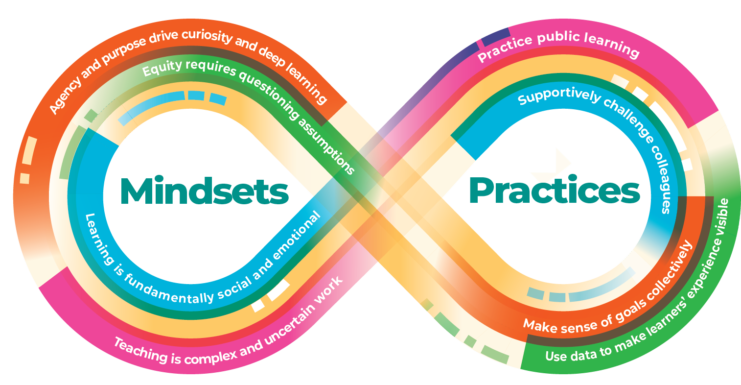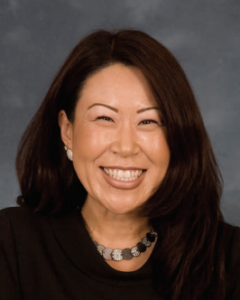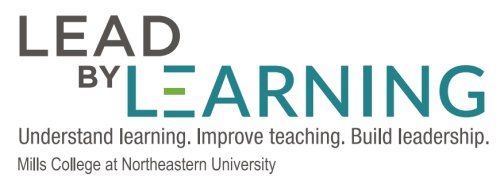
Creating a community of practice that inspires and sustains instructional leaders
As I noticed many district and school leaders around me also struggling to feel connected to their visions for improvement in the midst of their day-to-day challenges, I began asking, how can leaders bring about transformation when they themselves don’t have time to connect with their visions?
Creating a community of practice for leaders
In order to address this question, my colleague, Julio Franco, and I created a community of practice for all of West Contra Costa’s middle and high school principals. We wanted this to be a space in which principals could learn from one another and collaborate on how to support teacher growth. This was important to us because we know that when teachers learn through the guidance of strong leadership, student learning also improves.
One of our central values in creating this community of practice was to ground our conversations in qualitative data and to seek to understand what our students were experiencing. We knew that in order to support teachers, we had to observe what was happening in classrooms so we could provide feedback. So we decided to incorporate walk-throughs into our monthly practice, first observing and gathering data before sitting down to talk as a team of leaders. In order to further refine our conversations, we chose to focus the walk-throughs on math the first year, because our summative data showed great need in this area.
Looking back on the first year, we celebrated some successes, and we also found many ways in which we wanted to improve. We wanted to do better in measuring the impact of this community of practice by cycling back to what happened after the walk-throughs. Moving forward, we wanted to give principals space to think about their own learning and how they were working to bolster teacher learning.
Partnering with Mills Teacher Scholars to deepen our community of practice
When I found out about the goal and mission of Mills Teacher Scholars, I saw how closely it aligned with West Contra Costa’s updated Road Map goals of deeper learning and symmetry, so it made sense to partner with them to deepen this community of practice. I felt that Mills Teacher Scholars could help us both deepen our own learning and improve facilitating teacher learning at our sites by modeling what impactful adult learning looks like. We spoke to Jennifer Ahn, our Mills Teacher Scholars partner, who listened to what we had done prior and helped us design this year’s professional development building off of what we had already established.
With Jen’s guidance, we continued to include walk-throughs this year, but instead of focusing on math, we gave principals the autonomy to choose their own focus. This was an important shift because last year, when we made everyone focus on math instruction, it felt scripted in terms of what classrooms we would see.
Also, we started asking principals to be public learners. Each month, a different principal was the public learner, framing a dilemma, asking for us to look at what was happening in their classrooms with a particular lens related to the dilemma, and then coming back and inviting feedback and multiple perspectives based on what we saw. Through this powerful Mills Teacher Scholars practice, we went from “show and tell” to digging into real dilemmas together. Principal public learning is counter to what school systems typically practice, as we generally expect principals to lead learning, without giving them a chance to learn and to surface their own uncertainties. Perhaps we fear that expressing uncertainty would show weak leadership, but in reality it’s the source of inspiration, innovation, and partnership.
We created space for principals to reflect on the conditions that they were creating for teachers to learn. This year, after walk-throughs, we ask principals to talk about what they have done to create the conditions–what they’re doing at their sites to explain what we just saw in the walk-throughs. We are asking principals to not just think about teachers, but to also think about themselves, and to reflect on how they impact teacher and student learning.
Being able to hear from principals about what matters to them and go into their classrooms allows us to glean so much more, especially regarding culture and climate, which is a prerequisite to instruction.
Take-aways from this year
- Students are ready to be empowered and challenged. This is very different from what we feel sometimes when we see school performance data. We have to ask ourselves, “How do we push them to the next level?” This realization brings us together in a shared purpose.
- The power of a community of practice is when people feel connected through their work and more open to being vulnerable and sharing uncertainties, which is a prerequisite to moving forward. Principals have told us that it is invaluable to see how other principals provide feedback, set up their ILT, and work on shared goals. They are able to talk about things that matter to them and latch on to something that they can actually take back to their sites.
- We, as leaders, need thought partners. Jen was able to provide skillful thought partnership for me and Julio as we redesigned this community of practice. Through her deep listening, thoughtful questions and reframing, we learned so much more about ourselves and our vision.
This community of practice is about supporting principals, but it has also supported me as a district leader. When we’re in a role or have a title, we feel like we have to know it all. We tell our direct reports what they need to do. We are swept up by other priorities. But we are working with high capacity, passionate, educators. I appreciate every opportunity I get to talk to principals. I get excited and inspired by my conversations with them. I learn from them. The more I learn about them, the more I realize what they do. I am disappointed in myself that I didn’t know this earlier on. Having the space and the vulnerability to be honest with whomever you’re working with is the key. My hope is to bring out something better in others because I’m willing to learn and I see that they have so much to offer. I am constantly reminded in this space that I am learning from the principals, and the inspiration I get from them is something I can then feed back to them.
This article was written in August 2020, Mills Teacher Scholars changed their name to Lead by Learning in November of 2020.

Dr. Anne Shin is the Executive Director of Secondary Education, Curriculum, Assessment & Instruction in West Contra Costa Unified School District. She was a graduate of WCCUSD herself, Pinole Valley High School, and has served 25+ years in the district as a teacher at Pinole Middle, Grant Elementary, Cesar Chavez Elementary, site administrator at Bayview Elementary, Collins Elementary, and Middle College High School, and district leader.
